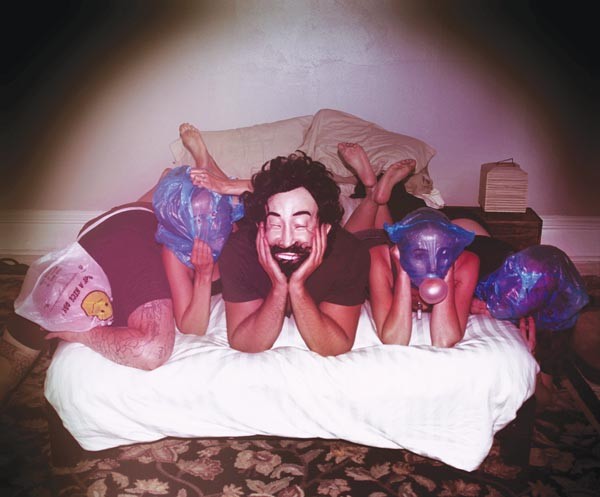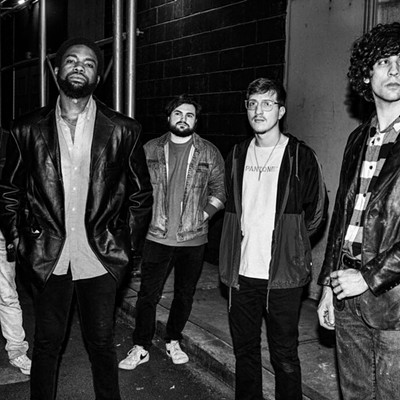Ryan Graveface can't stop.
"As I'm talking to you right now, even though I'm not innately nervous about this interview, I'm pacing," says the Black Moth Super Rainbow guitarist, on the phone from his Savannah, Ga., home. "I'm just a vile human being in that regard. I can't sit still. I work 20 to 22 hours a day every day. I have no personal [or] social life. I don't have a couch, for example, because I would never be able to sit down and watch something. I don't own a TV.
"I write 1,500 to 2,000 songs a year," he adds. "I've been writing that quantity of music since I was 17 or 18 years old."
Now 31, Graveface — a name he's taken to protect his privacy — has amassed a truly massive back catalog of both music and experience.
In allowing his creativity to take the lead, Graveface has seen some strange territory. He finds expression in no fewer than four bands: Black Moth, Dreamend, Marshmallow Ghosts (a semi-annual Halloween-themed multimedia affair) and, most recently, Casket Girls. He runs a record label, Graveface Records (fast approaching its 70th offering), on which he releases his own music and that of bands he's personally curated. With few exceptions, he oversees every aspect of each release, from the artwork to the packaging to the distribution. He also runs a storefront, which he bills as a curiosity shop, from which he sells his label's releases and displays the oddities that fascinate him and inform his work.
Though Graveface is perhaps best known for his work with Black Moth Super Rainbow, he cedes creative control in that venture to the band's founder, Tom Fec, who records under the name Tobacco. It was Graveface who initiated their collaboration, though, after reading a blogger's review of the first Black Moth album, Falling Through a Field, in which the record was compared to Graveface's own Dreamend project.
"I plugged [him] into Google and we just started working together," Graveface says. "From that day, in several different ways, that was the beginning of our collaboration."
In working with Tobacco, Graveface makes his opinions known, often bluntly. Recalling his first time seeing Black Moth live at the now-defunct Project 1877 in Garfield, Graveface says, "I didn't think they were exceptional live because it was basically just an iPod thing, so my advice to Tom was to find a full band. I think they would basically destroy the world if they were a real band because the music is so significant and powerful that it needs to be played by humans."
Soon after, Tobacco emailed to tell him that he'd found a drummer. Graveface's input has been indispensable in pushing Black Moth Super Rainbow into fresh creative territory. Recently, his voice was among the loudest and most passionate to suggest that Tobacco turn to Kickstarter to finance the latest Black Moth Super Rainbow album, the ambitious and unconventional Cobra Juicy. The campaign netted more than $125,000 in donations, practically enough to wage a congressional electoral campaign. (See sidebar, "Unmasking Tobacco.")
Graveface writes at least five songs every night. He does this out of compulsion, with no goals beyond getting the songs out of his head. When it's time to put out a record, he lets intuition dictate under which of his creative vehicles the best of his vast output should be released. This level of creative control is one of the advantages of working alone.
To date, Graveface's Dreamend project has been the throughline of his career. Though the Dreamend sound tends toward the lo-fi and the psychedelic, featuring acoustic guitars or banjos, the Dreamend designation is applied less for the sound of the music than for the feeling it evokes within its maker. Of all his projects, he says, Dreamend is the most emotionally taxing. "I can't [even] play anything off the third Dreamend record because the premise is so depressing," he says. "I don't even think I could get through a concert, playing that stuff, without weeping."
Such singular dedication can take its toll. For Graveface, collaboration seems to ease some of the tension he feels. "I have very strong ideas," he says. "I have apparently surrounded myself with people who knock it out of the park every time."
For the Casket Girls project, Graveface seems to have met his match in the Greene sisters, Elsa and Phaedra, who are willing and able to keep up with his rigorous creative pace. After running into them by chance, in Savannah, he gave them song structures that were originally intended for his Marshmallow Ghosts project, asking them to supply lyrics. They returned with words that were haunting in their beauty and wholly complementary to Graveface's sound.
The resulting record, Sleepwalking, combines the sisters' haunting voices with Graveface's menacing drone, yielding a sound that is equal parts shoegaze and Shangri-Las. It worked so well that he gave them more songs. Their collaboration has already yielded upward of 50 songs with more in the pipeline.
His creative drive precludes Graveface from a normal life. His is an existence that is unique in its utter lack of compromise. Though his compulsion has often taken a toll on his social life, he understands that the creative pursuit, in whatever the form, involves some discomfort. Lately, he's been learning taxidermy.
"I'm really interested in grotesque things," he says. "But I have a very hard time, physically, doing grotesque things."













